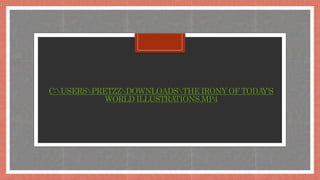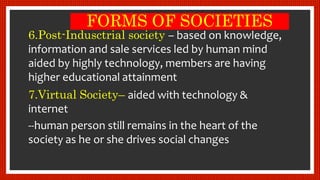society ppt.pptx
- 1. C:USERSPRETZZDOWNLOADSTHE IRONY OF TODA Y'S WORLD ILLUSTRATIONS.MP4
- 3. Exists to relate others By nature is a social being A person experiences variety of relationships (shape him as a person) Expand horizons Establish friendships Deal with other figures of authority
- 4. SOCIETY Organized group of people whose members interact frequently and have common territory and culture Companionship or friendly association with others Alliance, union, community Humans influence society through actions Provides opportunities to further growth in coming years
- 5. SOCIAL CONTRACT THEORY persons are governed by their desires often lead to conflict -“social contract” (agreement) persons are more cooperative and reasonable knows as “consent of the governed” -people are one who organized society and established an authority “general will”—empowered gov’t to act in their behalf.
- 6. SOCIAL CONTRACT THEORY humans having “a veil of ignorance” –to seek a just and a fair society people’s “self interest” actions of individual in meeting their individual needs --share one common feature “enter into kind of agreement” -society one is not compromised for the sake of other—ensures development of the individual
- 7. COMMON GOOD desire to achieve the goal of survival united and work together because of the natural desire for goodness refers to social conditions which enables persons & groups to fulfill their goals and achieve well-being Peace and order Clean and safe public spaces Efficient transport system Efficient public services
- 8. FORMS OF SOCIETIES 1. Hunting & Gathering– earliest & simplest, nomadic, members treated equally (consensus) 2. Pastoral Society– domestication of animals for more stable food and supply, trade with other societies, engage in handicrafts 3. Horticultural Society-small scale cultivation & domestication, semi-nomadic, tasks assigned accrdg. to gender, often very family and clan oriented (restrictions by tradition)
- 9. FORMS OF SOCIETIES 4.Agrarian or agricultural society – improved technology & use of tools to aid in farming, structured social system often lead to conflict 5.Feudal Society– ownership of the land, vassal (loyal to his lord)—served by peasants(workers), “higher classes”- treated with respects 6.Industrial Society- specialized machineries, innovations, transportations & communication , capitalists( most influential)
- 10. FORMS OF SOCIETIES 6.Post-Indusctrial society – based on knowledge, information and sale services led by human mind aided by highly technology, members are having higher educational attainment 7.Virtual Society– aided with technology & internet --human person still remains in the heart of the society as he or she drives social changes









